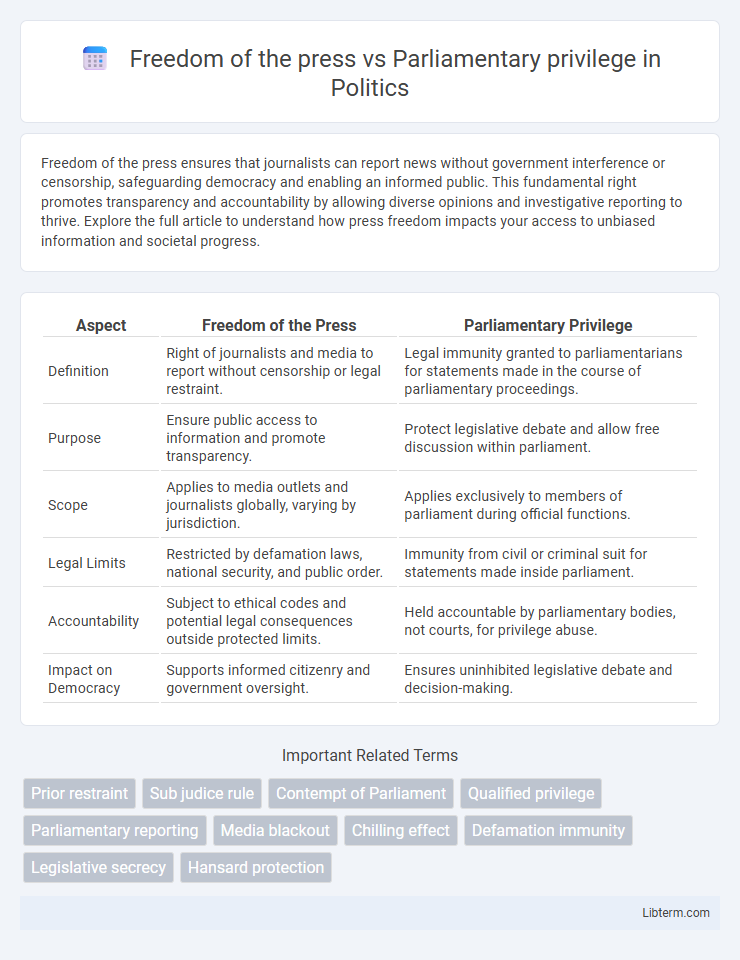Freedom of the press ensures that journalists can report news without government interference or censorship, safeguarding democracy and enabling an informed public. This fundamental right promotes transparency and accountability by allowing diverse opinions and investigative reporting to thrive. Explore the full article to understand how press freedom impacts your access to unbiased information and societal progress.
Table of Comparison
| Aspect | Freedom of the Press | Parliamentary Privilege |
|---|---|---|
| Definition | Right of journalists and media to report without censorship or legal restraint. | Legal immunity granted to parliamentarians for statements made in the course of parliamentary proceedings. |
| Purpose | Ensure public access to information and promote transparency. | Protect legislative debate and allow free discussion within parliament. |
| Scope | Applies to media outlets and journalists globally, varying by jurisdiction. | Applies exclusively to members of parliament during official functions. |
| Legal Limits | Restricted by defamation laws, national security, and public order. | Immunity from civil or criminal suit for statements made inside parliament. |
| Accountability | Subject to ethical codes and potential legal consequences outside protected limits. | Held accountable by parliamentary bodies, not courts, for privilege abuse. |
| Impact on Democracy | Supports informed citizenry and government oversight. | Ensures uninhibited legislative debate and decision-making. |
Defining Freedom of the Press
Freedom of the press guarantees journalists the right to publish information without government censorship, ensuring transparency and accountability in democratic societies. Parliamentary privilege protects legislators by allowing them to speak freely within parliamentary proceedings without risk of legal action, enabling uninhibited debate on public matters. Defining freedom of the press involves balancing the media's role in informing the public against the legal immunities granted to parliamentarians for robust legislative discussions.
Understanding Parliamentary Privilege
Parliamentary privilege grants members of Parliament legal immunity to speak freely during debates without fear of outside legal consequences, ensuring open and honest legislative discussions. This privilege protects statements made within parliamentary proceedings from defamation suits, directly impacting the scope of freedom of the press when reporting on parliamentary activities. Balancing these protections requires careful consideration to uphold transparent governance while safeguarding press freedom against undue legal restrictions.
Historical Context: Press Freedom and Parliament
The historical context of press freedom versus parliamentary privilege highlights the ongoing tension between the media's role in holding government accountable and Parliament's need for confidential deliberations. Press freedom has evolved since the 17th century, marked by landmark events like the English Bill of Rights 1689, while parliamentary privilege dates back to the House of Commons' assertion of exclusive rights in the 16th century. The balance between these principles remains critical for transparency and democratic governance in modern legal frameworks.
Legal Foundations and Statutes
Freedom of the press is safeguarded under constitutional provisions such as the First Amendment in the United States and Article 19 of the Indian Constitution, ensuring uninhibited journalistic expression. Parliamentary privilege, established through statutes like the UK's Bill of Rights 1689 and the Parliamentary Papers Act 1840, grants legislators immunity to perform legislative duties without external interference. Legal foundations balance these rights by delineating boundaries where press freedom does not infringe on parliamentary privileges, protecting the integrity of legislative processes and democratic accountability.
Case Studies: Notable Clashes and Precedents
Freedom of the press frequently clashes with parliamentary privilege in landmark cases such as the UK's Pepper v Hart (1993), where the courts limited press freedom to protect parliamentary proceedings from external scrutiny. In Australia, Lange v ABC (1997) highlighted the balance between defamation laws and the media's right to report on parliamentary affairs under qualified privilege. These case studies illustrate evolving judicial attempts to delineate boundaries that safeguard both transparent governance and robust media freedom.
Balancing Accountability and Confidentiality
Freedom of the press is essential for democratic transparency, enabling journalists to expose government misconduct and inform the public. Parliamentary privilege grants legislators confidential communication and immunity within parliamentary proceedings to ensure candid debate and effective governance. Balancing these principles requires protecting press freedom to hold power accountable while safeguarding confidential parliamentary processes that preserve legislative integrity and national security.
Impact on Investigative Journalism
Freedom of the press is crucial for investigative journalism as it enables reporters to uncover government corruption without fear of censorship. Parliamentary privilege grants lawmakers immunity from legal action for statements made within parliament, which can sometimes shield them from investigative scrutiny. This tension limits journalists' ability to hold public officials accountable, impacting the depth and effectiveness of political investigations.
Contempt of Parliament vs Public Interest Reporting
Contempt of Parliament arises when individuals or media outlets disclose information that Parliament has ordered to remain confidential, potentially undermining legislative functions. Freedom of the press embodies the public interest in transparent reporting and holds government accountable by disseminating information crucial for democratic oversight. Balancing parliamentary privilege and public interest reporting requires careful legal interpretation to protect legislative integrity while ensuring the media can report responsibly on governance matters.
International Perspectives and Comparisons
International perspectives on freedom of the press versus parliamentary privilege reveal varying balances between transparency and legislative immunity. Countries like the United Kingdom uphold strong parliamentary privilege to protect legislators from external influence and preserve debate confidentiality, while nations such as the United States prioritize press freedom with limited legislative immunity, promoting government accountability. Comparative studies highlight that jurisdictions with robust press freedoms often implement clearer legal boundaries to prevent conflict with parliamentary privileges, enhancing democratic oversight.
Future Challenges and Evolving Norms
Future challenges in balancing freedom of the press with parliamentary privilege include managing conflicts between journalistic transparency and the protection of confidential legislative processes. Evolving norms suggest a need for clearer legal frameworks to delineate boundaries while respecting both democratic accountability and institutional integrity. Technological advancements and the increasing role of social media amplify the urgency to adapt regulations that uphold press freedom without undermining parliamentary functions.
Freedom of the press Infographic

 libterm.com
libterm.com